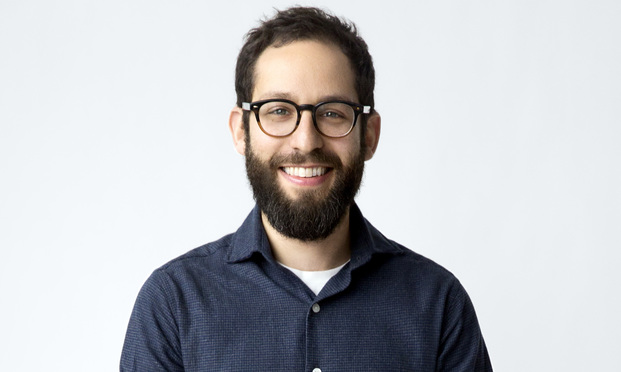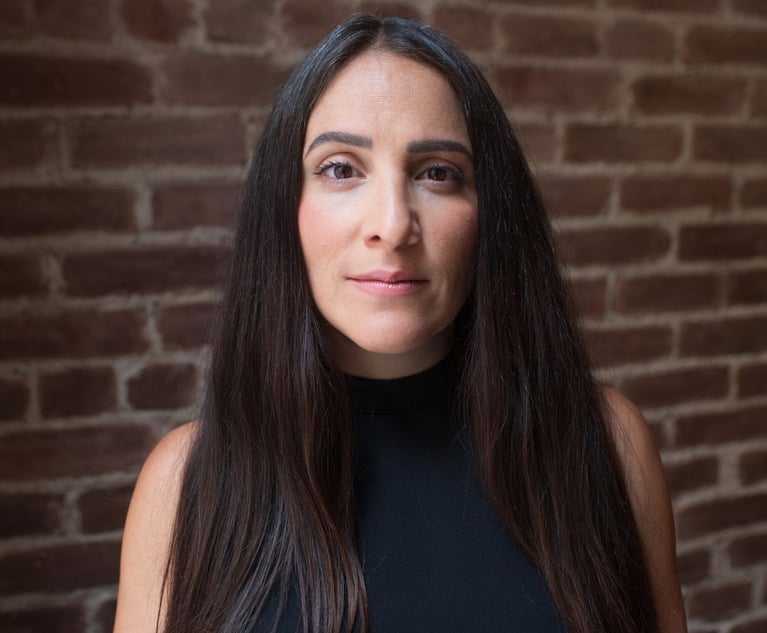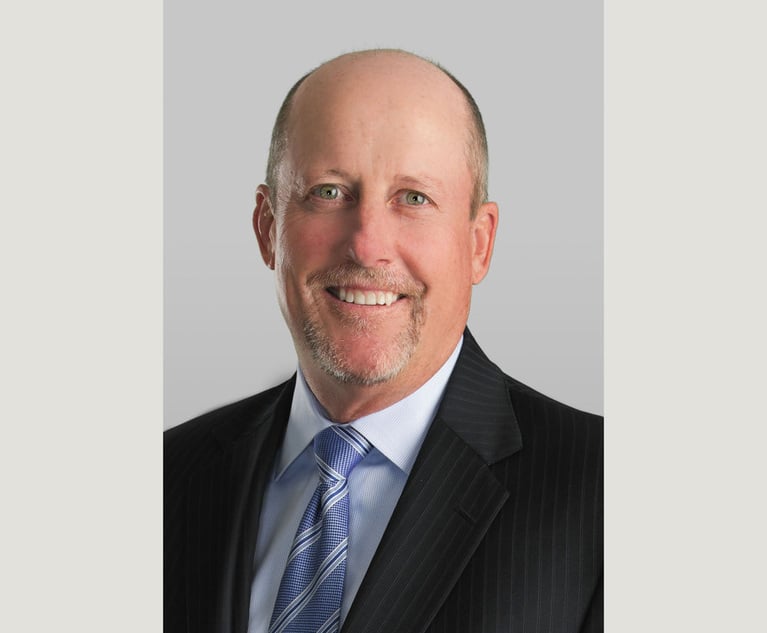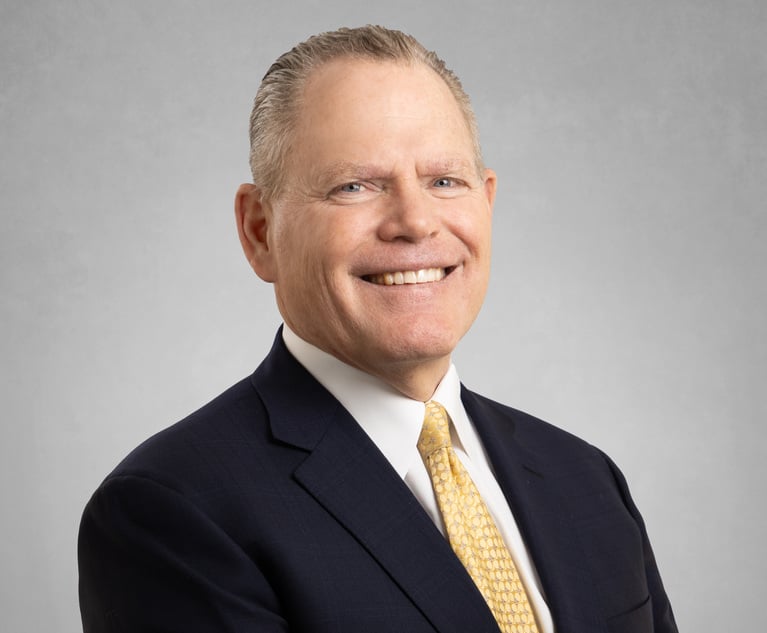'We're Being Thrust Into Every Decision': CaaStle General Counsel Talks COVID-19's Impact on In-House Legal
"For GCs, right now, I think the toughest part is that we're being thrust into every decision. I think that because of the fact that so much of what we are facing we have not faced before. Most of the things happening right now have a legal aspect to them," Tim Hirsch, general counsel at CaaStle, said.
July 14, 2020 at 03:39 PM
5 minute read
The original version of this story was published on Corporate Counsel
 Tim Hirsch, general counsel of CaaStle.
Tim Hirsch, general counsel of CaaStle.
The new coronavirus has elevated the already important role of a general counsel to be more involved as stores close down and reopen and state and local governments update safety protocols for bringing employees back to work.
Tim Hirsch, general counsel of New York-based fashion company CaaStle, said nearly every decision the company makes is now partially a legal one, whether it is best practices to opening up distribution centers to finding ways to collect and safely handling employee health information. To combat these challenges while working remotely, Hirsch said constant communication with the two other attorneys in his legal department is critical.
Hirsch, who is set to be a speaker at the General Counsel Conference, spoke to Corporate Counsel about work beyond the legal department, challenges during the pandemic and building a resilient team. This conversation has been edited for clarity and length.
Corporate Counsel: How does your role as general counsel go beyond the legal department at CaaStle?
Tim Hirsch: I always say that I am a member of the management team first and an attorney second. I think what makes the management team really effective is people thinking outside of their area of expertise and thinking about how they can use their area of expertise to affect business success and business outcomes.
I always try to think about what is our business objective first and how can I inform that path from my very specific vantage point. That is really the mindset that I bring to all of our conversations.
CC: What have been some of your biggest challenges as a general counsel during the pandemic?
TH: I think they are pretty similar to what everyone else's has been. For GCs, right now, I think the toughest part is that we're being thrust into every decision. I think that because of the fact that so much of what we are facing we have not faced before. Most of the things happening right now have a legal aspect to them.
I think my role as a part of the management team has been front and center. It really does feel like every decision has a legal component. Trying to get my team to be efficient and effective remotely is an added challenge.
CC: What are some of the legal issues you're focusing on right now?
TH: We operate distribution centers and we're implementing temperature checks. We have to keep up with health regulations and guidelines to make sure we walk the fine line between maintaining the most stringent standards from the health perspective. But also respecting the privacy and rights of our employees is also extremely crucial.
We went through a number of terminations and contract negotiations. The sheer volume of trying to renegotiate all of our agreements whether it is with our suppliers or our own customers has been really critical.
CC: What are the strategies you have put in place to ensure your legal team collaborates and there is a consensus of culture?
TH: I am all about informal communication channels. Slack, text, phone calls. I don't feel like as a team we get much out of big, long, formal meetings. We speak a lot, throughout the day and the week. The most important aspect of this is to create a culture where collaboration is valued, encouraged and rewarded. I try to make all successes team successes, and even more than that, business successes. When we all share the same goal and objective, collaboration becomes a natural way to operate, which furthers your overall strategic objectives.
CC: How do you build a resilient team? What do you see as your key responsibilities as a leader in cultivating resilience in your team?
TH: To me, the key to building a resilient team and organization is transparency and trust. I find that when times get tough, transparency is one of the best tools a manager has at his disposal to keep a team together. Being willing to confront difficulties and speak about them is the first and most important step to overcoming them in my opinion. So I am a big believer in over-communicating. As a leader, I push my team to share but also trust.
CC: How do you measure diversity, equity and inclusion at your company? What are some ways you as a leader can help drive those efforts?
TH: This is obviously a very crucial topic right now, and one that I take very seriously. We as a country need to wake and do much more to fight racism against the Black community, and bring not only diversity but equality to our society, and the same is true for our company. Diversity and equality are two very different things. I think we're a really diverse company, but that doesn't translate into equality, particularly as it comes to representation of minorities at the most senior level. As a management team, we're actively looking at what we need to do to bring change to our organization. I think the first step is to accept and recognize we have a problem and commit to fixing it. Specifically, this means committing to actively guiding and developing the careers of our Black employees and making sure we reward proactive inclusion and improved diversity outcomes that increase Black professional career progression and retention rates.
Join hundreds of your in-house counsel peers at the premier forum to network, learn and evolve in your legal role. Secure your place today at the General Counsel Conference, taking place Sept. 15-16, 2020. Register today!
This content has been archived. It is available through our partners, LexisNexis® and Bloomberg Law.
To view this content, please continue to their sites.
Not a Lexis Subscriber?
Subscribe Now
Not a Bloomberg Law Subscriber?
Subscribe Now
NOT FOR REPRINT
© 2025 ALM Global, LLC, All Rights Reserved. Request academic re-use from www.copyright.com. All other uses, submit a request to [email protected]. For more information visit Asset & Logo Licensing.
You Might Like
View All
How I Made Partner: 'Take Every Opportunity to Get Involved in the Business Side of the Firm,' Says Alyssa Domzal of Ballard Spahr

How I Made Practice Group Chair: 'Cultivating a Culture of Mutual Trust Is Essential,' Says Gina Piazza of Tarter Krinsky & Drogin

How I Made Managing Partner: 'Be the Uniting Voice of the Firm,' Says George Ogilvie of McDonald Carano

How I Made Managing Partner: 'Educate Yourself About Law Firm Economics,' Says Gregory Hessinger of Mitchell Silberberg
Trending Stories
- 1Buyer Beware:Continuity of Coverage in Legal Malpractice Insurance
- 2‘Listen, Listen, Listen’: Some Practice Tips From Judges in the Oakland Federal Courthouse
- 3BCLP Joins Saudi Legal Market with Plans to Open Two Offices
- 4White & Case Crosses $4M in PEP, $3B in Revenue in 'Breakthrough Year'
- 5Thursday Newspaper
Who Got The Work
J. Brugh Lower of Gibbons has entered an appearance for industrial equipment supplier Devco Corporation in a pending trademark infringement lawsuit. The suit, accusing the defendant of selling knock-off Graco products, was filed Dec. 18 in New Jersey District Court by Rivkin Radler on behalf of Graco Inc. and Graco Minnesota. The case, assigned to U.S. District Judge Zahid N. Quraishi, is 3:24-cv-11294, Graco Inc. et al v. Devco Corporation.
Who Got The Work
Rebecca Maller-Stein and Kent A. Yalowitz of Arnold & Porter Kaye Scholer have entered their appearances for Hanaco Venture Capital and its executives, Lior Prosor and David Frankel, in a pending securities lawsuit. The action, filed on Dec. 24 in New York Southern District Court by Zell, Aron & Co. on behalf of Goldeneye Advisors, accuses the defendants of negligently and fraudulently managing the plaintiff's $1 million investment. The case, assigned to U.S. District Judge Vernon S. Broderick, is 1:24-cv-09918, Goldeneye Advisors, LLC v. Hanaco Venture Capital, Ltd. et al.
Who Got The Work
Attorneys from A&O Shearman has stepped in as defense counsel for Toronto-Dominion Bank and other defendants in a pending securities class action. The suit, filed Dec. 11 in New York Southern District Court by Bleichmar Fonti & Auld, accuses the defendants of concealing the bank's 'pervasive' deficiencies in regards to its compliance with the Bank Secrecy Act and the quality of its anti-money laundering controls. The case, assigned to U.S. District Judge Arun Subramanian, is 1:24-cv-09445, Gonzalez v. The Toronto-Dominion Bank et al.
Who Got The Work
Crown Castle International, a Pennsylvania company providing shared communications infrastructure, has turned to Luke D. Wolf of Gordon Rees Scully Mansukhani to fend off a pending breach-of-contract lawsuit. The court action, filed Nov. 25 in Michigan Eastern District Court by Hooper Hathaway PC on behalf of The Town Residences LLC, accuses Crown Castle of failing to transfer approximately $30,000 in utility payments from T-Mobile in breach of a roof-top lease and assignment agreement. The case, assigned to U.S. District Judge Susan K. Declercq, is 2:24-cv-13131, The Town Residences LLC v. T-Mobile US, Inc. et al.
Who Got The Work
Wilfred P. Coronato and Daniel M. Schwartz of McCarter & English have stepped in as defense counsel to Electrolux Home Products Inc. in a pending product liability lawsuit. The court action, filed Nov. 26 in New York Eastern District Court by Poulos Lopiccolo PC and Nagel Rice LLP on behalf of David Stern, alleges that the defendant's refrigerators’ drawers and shelving repeatedly break and fall apart within months after purchase. The case, assigned to U.S. District Judge Joan M. Azrack, is 2:24-cv-08204, Stern v. Electrolux Home Products, Inc.
Featured Firms
Law Offices of Gary Martin Hays & Associates, P.C.
(470) 294-1674
Law Offices of Mark E. Salomone
(857) 444-6468
Smith & Hassler
(713) 739-1250








